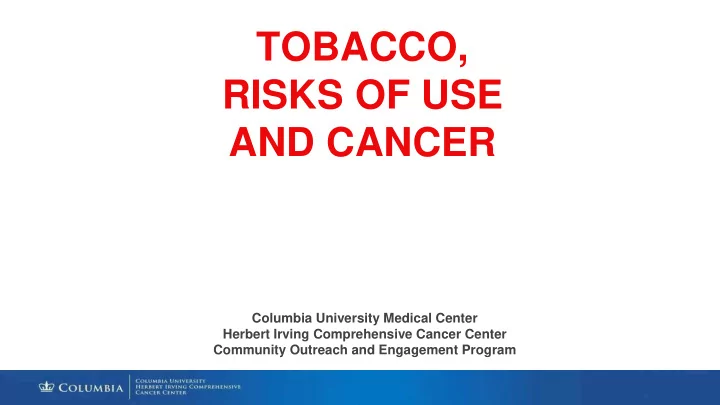

TOBACCO, RISKS OF USE AND CANCER Columbia University Medical Center Herbert Irving Comprehensive Cancer Center Community Outreach and Engagement Program
We will be talking about: • Tobacco • Different types of tobacco products • Smoked • Smokeless • Dissolvables • Vape • What is in tobacco products? • What harm can tobacco products do to your body • Where to get help to quit smoking
What is Tobacco? Chopped Tobacco Tobacco Plant Drying Tobacco Leaves Leaves
Smoked Tobacco Products Cigarettes Cigars/Cigarrillos Pipe Bidis Kreteks Hookah
What is in a Cigarette?
What Does Smoking do to Your Body?
What does smoking do to your lungs?
Secondhand Smoke • Secondhand smoke is smoke inhaled involuntarily from tobacco being smoked by others • Many health problems in infants and children are caused by secondhand smoke • Wheezing and coughing are more common in children who breathe secondhand smoke • Asthma attacks can be triggered in a child who breathes secondhand smoke • Ear infections are more common in children whose parents smoke around them • Some of the health conditions caused by secondhand smoke in adults include coronary heart disease, stroke, and lung cancer
Smoking During Pregnancy • Smoking during pregnancy increases the risk for pregnancy complications • Babies of smokers • can be born too early and too small • can have birth defects • Be born with damage in the development of babies’ brain and lungs
What is Hookah or Water Pipe? • A hookah is a water pipe • Hookah is also known also known as a narghile, shisha or goza • The hookah pipe tobacco has the same chemicals and is as unsafe as cigarettes • The water in the hookah does not filter out the toxic ingredients in the tobacco smoke
BECAUSE: • One session of hookah pipe smoking lasts about 45 minutes to an hour (while a cigarette last just a few minutes) • During that time hookah users may breathe in as much smoke as a cigarette smoker would from 100 or more cigarettes
Why is Hookah use dangerous? Hookah smoking increases the risk of: Women and Men: • Have decreased fertility • Can get herpes, hepatitis and tuberculosis (from sharing the same mouthpiece) Babies: • Born to women who smoke hookahs are more likely to have a low birth weight and breathing problems
What are E-Cigarettes? • E-cigarettes are electronic devices that heat a liquid and produce vapor or a mist of small particles in the air • E-cigarettes come in many shapes and sizes. Most have a battery, a heating element, and a place to hold a liquid • Using an e-cigarette is sometimes called vaping • Some e-cigarettes look like regular cigarettes, cigars, or pipes. Some look like USB flash drives, pens, and other everyday items
What is in E-Cigarette Vapor? :
E- Cigarettes Can Harm Children • Nicotine can harm the developing adolescent brain. The brain keeps developing until about age 25 • Using nicotine in adolescence can harm the parts of the brain that control attention, learning, mood, and impulse control • Using nicotine in adolescence may also increase risk for future addiction to other drugs • The use of e-cigarettes is unsafe for kids, teens, and young adults
Smokeless Tobacco Products Smokeless Moist Snuff Smokeless Chew (Snus) Smokeless Dry Snuff
Smokeless Tobacco Products that dissolve, or melt in your mouth
What is in a smokeless tobacco product?
Health risks of smokeless tobacco include: Smokeless tobacco
Holding smokeless tobacco in your mouth for 30 minutes gives you as much nicotine as smoking 3 cigarettes.
What are the BENEFITS of Quitting?
What will Tobacco Treatment Programs Do For You? • Give you with treatment options that work for you • Help you choose the best treatments • Give you ongoing support and motivation that you need to QUIT • Answer your questions • Help you to avoid starting again
Call the Tobacco Treatment Program at New York Presbyterian Hospital Annery Polanco, B.S Health Priorities Specialist Tel: 646-317-QUIT (7848) Email: Anp9201@nyp.org Web: quittobacco@nyp.org YOUCAN Dr. Anny Eusebio (DNP, CTTS) Tobacco Treatment Nurse Practitioner SM@KING! Cell: 646-599-6740 Email: aeusebio@nyp.org
Thank You! WHA HAT ARE ARE YOUR R QU QUESTIONS?
This presentation was developed by: NEW YORK PRESBYTERIAN TOBACCO TREATMENT PROGRAM Annery Polanco, B.S Dr. Anny Eusebio DNP, CTTS Herbert Irving Comprehensive Cancer Center COE Andria Reyes, MA Karen Schmitt, MA, BSN Mary Beth Terry, PhD
Recommend
More recommend